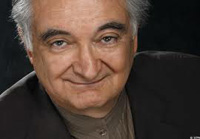In the first edition of my book, “Noise: the political economy of music”, published in 1977, I was arguing that music is not coincidental. That there is nothing random about it. Nor is it anecdotal in the history of societies. Fundamentally, music is a metaphor for putting in order. Indeed, by transforming noise into harmony, extracting beauty from chaos, thus softening the mores, music shows that violence is manageable. And ultimately, that society is possible. Therefore, music is the echo of the aesthetics of a particular time. But it also goes beyond that time. As it explores, through a specific code, the immense field of possibilities in a faster way than the material reality could typically do it itself, music translates into sounds what will become visible and prevail in the real world. It foresees changes and announces a new social order by giving a sense to reality. In many ways, the study of music is a study of modernity.
In my view expressed in the book, music has always anticipated major transformations of the society. During three distinct periods of time, it expressed itself through three specific codes corresponding with three models of political economy. In the beginning, it assumed a sacrificial function reflected in ancient rites. At that time, music played the role of a scapegoat whose sacrifice was channeling the violence. In doing so, it announced one of the first divisions of labor (creator vs. listener), as well as many upcoming social differentiations. Then, in the XVIth century, music turned into representation, becoming more of a commercial product. This trend was quickly transposed to the other forms of human creation. Then, at the end of the XIXth century, this representation became repetition. A new society was then prefigured, led by a mass production for solitary listeners, the reign of youth, the autistic and global entertainment, as well as by many practices such as hacking or copying.
These changes paved the way to a fourth social transformation, in which the repetition converted into “composition”. The shift from the pleasure of listening to and owning music, to the pleasure of making music and sharing it for free announces an evolution towards a new paradigm of society: more open, more unstable, where work is no longer a matter of accumulation, but a constant reinvention of rhythms, styles and rules. Hence, music points to a new phase of capitalism. The main tradable good will be immaterial, in the form of information, whose value will reside in its ability of connecting people. Likewise, the instruments of composition and simulating will prevail, whereas new forms of exercising power, such as notation of the service providers, could emerge. I predicted in 1977 that this trend will be mostly perceived in three main areas: entertainment, health and training. Overall, music announces a time of networking and exchanges between creators, as well as many innovative forms of fraternity. In this way, creative economy itself forecasts an economy of the gift.
This vision, I first developed in 1977 and confirmed in the 2000s. aims at confronting reality in order to infer new predictions and build a comprehensive analysis of both the history of modernity and its future. It helps to predict quite clearly the arrival of immaterial music, the difficulty of having people to pay for it and the development of new musical instruments as well as of “amateur musicians”. It is also this methodology that led me to predict the importance of the “spectacle vivant”, the growth of Africa and limits of China. I identifed, observing music, seven possible evolutions of modernity, which I have further conceptualized in terms of hypermodernity (the global triumph of reason and of its form of political organization : the market democracy), amodernity (a deliberate rejection of the need to think the future), retromodernity (a nostalgic desire to go back to a previous order and old values), ethnomodernity (a rise of identity-related tensions and a desire to turn inward and close borders), theomodernity (a return of the supremacy of a revealed truth over reason), ecomodernity (the prevalence of environmental concerns over civil liberties). The ultimate form of modernity is the one that will naturally derive from the economy of the gift, as it is announced by the evolution of music, namely the altermodernity built on a profound sense of altruism – in particular with regards to future generations – and in which the happiness of the other is a condition of our own.
We could also explore the reason why music could be seen as predictive: as an immaterial activity, it explores more rapidly than any other the realm of potentials. In that sense, it is not ffar from another quasi immaterial activity, finance, which is also very often an excellent predictive tool.

